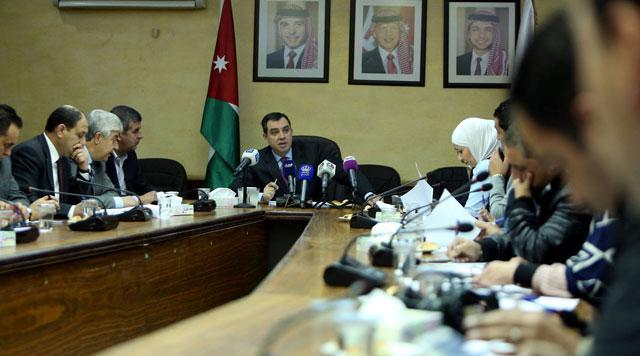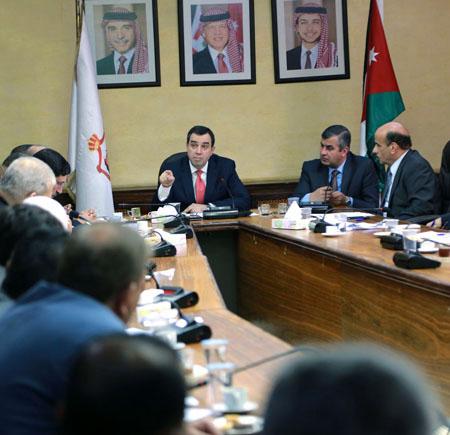You are here
Planning Ministry embarks on development plans for governorates
By Khetam Malkawi - Apr 11,2015 - Last updated at Apr 11,2015

AMMAN —The Ministry of Planning and International Cooperation on Saturday announced the start of preparations for the governorates developmental programmes for the years 2016-2018, in addition to update the currently implemented programme for the years 2013-2016.
Minister of Planning and International Cooperation Imad Fakhoury said the ministry has started preparations for the development programme that will also be the first phase of Jordan’s 2025 vision that will be launched soon.
Fakhoury noted that a national team of 35 members, headed by the ministry’s secretary general, will be tasked to observe preparations for this programme, in addition to teams from the different governorates to define developmental priorities of each governorate.
At a press conference on Saturday, the minister explained that the objective of the 2016-2018 programme will complement what has been and will be achieved in the current programme and seeks to enhance the production capacity of the governorates based on competitiveness.
The programme will also include studying the developmental situation in each governorate and analysing demographic, economic and social indicators such as poverty, unemployment, family income, education, health and job market.
These indicators will help in defining developmental challenges in each of the Kingdom’s governorates and opportunities that aim at encouraging investments and local economy to contribute to the achievement of comprehensive and balanced development.
Meanwhile, the minister said that the investment maps in the northern region have been drawn up and work will start on identifying investment opportunities in the central and southern governorates.
These maps, he explained, will be included in the upcoming developmental programme.
In addition, Fakhoury noted that the Syrian refugee crisis has had an impact on the host communities and the development plans in the country’s governorates, thus, the Jordan Response Plan (JRP) has tailored projects to address this impact which will be connected to national developmental schemes.
However, the minister pointed out that the funds generated through the bilateral cooperation to support Jordanian programmes will not be used to support the implementation of the JRP.
As for the mechanism of priority identification, the minister explained that field visits to governorates will be organised, in coordination with the Interior Ministry and concerned ministers will be invited to take part in these visits, based on the development role their ministries are expected to perform in these governorates.
He added that the visits are to feature meetings with lawmakers and the public in order to review initial drafts and reach consensus to include them in the 2016-2018 development programme. This phase is scheduled to be completed by the end of July, according to Fakhoury.
As for allocations to implement the projects to be listed in the governorates development programmes, the minister said that part of these will be financed by the state budget, starting next year, and the rest will be implemented through investments and partnerships with the private sector.
August is the deadline for completing the executive development programme according to the set time frame, Fakhoury said, adding that the timing will allow planners to include additional plans in the 2016 draft budget law and the 2017-2018 indicators.
The programme will include performance indicators on three levels: national, sectoral and executive, the minister said.
A unit at the Prime Ministry will come up with a follow-up system to monitor performance and issue periodic reports on the major initiatives, with the Ministry of Planning and International Cooperation overseeing the detailed implementation, in addition to assessing the impact of the 2016-2018 development programme, he added.
As for the implementation of the programmes that were part of the 2013-2016 programme, Kuwait’s share in the Gulf Cooperation Council (GCC) grant, which reached JD45.861 million in 2013, was used to implement development projects that respond to unanswered needs of governorates in several major sectors, including health, education, water, roads, tourism and agriculture.
During 2014, funding worth JD60 million was used in projects to support municipalities with machinery to perform their development role, as well as in touristic and agricultural productive projects in governorates with competitive features in these two fields.
In 2015, funding worth JD53.3 million has been allocated to execute development projects addressing unanswered needs in governorates in several main sectors.
Related Articles
AMMAN — Minister of Planning and International Cooperation Imad Fakhoury on Monday chaired the first meeting of the coordinating committee o
AMMAN — The government on Wednesday will start discussing the draft for upgrading governorate development programmes for the years 2016-2018
AMMAN — Planning and International Cooperation Minister Imad Fakhoury on Monday said that his ministry is looking forward to the USAID, to f












